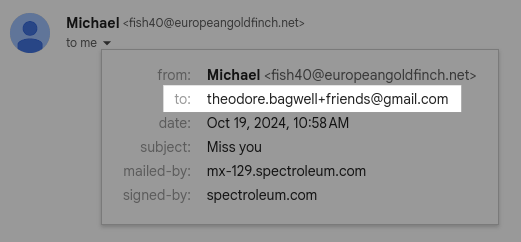We're updating our Terms of Service to ensure fairness and sustainability of our Free Plan: learn what's changing and how it affects you.
What is plus addressing?
Plus addressing, also known as subaddressing, is a simple but powerful feature offered by many email providers like Gmail, Yahoo, and Microsoft Outlook: it allows users to customize their email addresses by appending a + sign followed by a tag or identifier, without needing to register new accounts. The key benefit of plus addressing is that it allows users to categorize incoming emails, identify the source of messages, and manage their inboxes more effectively. With plus addressing, the core email remains the same, but users can append different labels for various purposes.
For example, if your email is theodore.bagwell@gmail.com, you can create customized addresses like theodore.bagwell+newsletters@gmail.com or theodore.bagwell+questions@gmail.com: the emails will still be delivered to the main inbox theodore.bagwell@gmail.com, making this feature useful for organizing and tracking emails. Most email providers offering plus addressing also allow to set up filters to automatically route or handle the messages based on the added tag.
Here is a screenshot demonstrating plus addressing in Gmail, using the friends tag:

For businesses that rely on email marketing, customer engagement, and lead generation, ensuring that email addresses are valid and deliverable is critical. However, plus addressing makes it difficult to track duplicates or detect invalid email addresses: when users sign up with multiple versions of the same email, it can inflate email list numbers and increase the risk of sending redundant or unnecessary emails. Verifalia’s advanced email verification accurately detects email addresses using plus addressing, ensuring they are legitimate, active, and safe to send to. When a mailing list contains multiple variations of the same address, Verifalia intelligently flags them as duplicates, so you can remove them.
Plus addressing vs. disposable emails
As a related argument, while plus addressing is tied to valid, long-term email accounts, disposable email addresses are temporary and created for short-term use: users often turn to disposable emails when they want to sign up for a service without providing their real email address, which can lead to fake registrations and false engagement. In fact, disposable email addresses can harm businesses by reducing engagement rates, increasing email bounces, and even damaging sender reputation: Verifalia’s email verification system can detect and filter out disposable emails during the verification process, flagging temporary and unreliable email addresses while performing mail list cleaning.